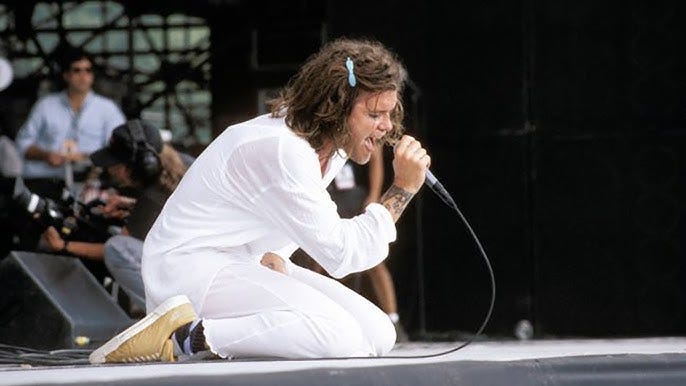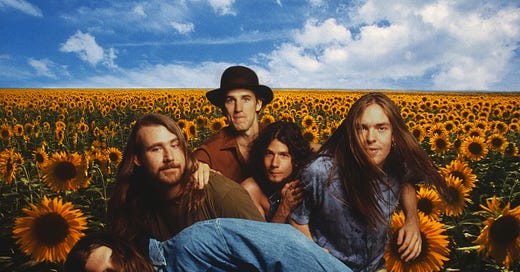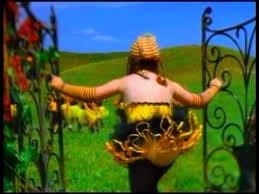This post is part of a series of personal essays about the connections between pop culture and queer identity. Check out other posts on Fiona Apple and Buffy: The Vampire Slayer.
On a long drive with my husband, Peter, I selected one of those Spotify road trip playlists. During “November Rain,” I pulled out some trivia that I’d read once:
“Did you know that Axl Rose was the cousin of Shannon Hoon from Blind Melon?”
Peter gave me a suspicious look.
I was always trying to get him to appreciate Blind Melon, one of my favorite bands. He could never get into them.
“No, really! Listen, you can hear it in their voices.”
I queued up Blind Melon’s “No Rain.” Everyone loves that song. Maybe it’ll finally click for him.
“See?” I insisted.
“Okay, I hear it. They sound alike. But do cousins sound alike? Is that a thing? Something seems off about this to me. Look it up.”
He was driving, so I was able to look it up immediately.
I was totally wrong.
Shannon Hoon sang backup vocals for some of Guns N’ Roses’s biggest hits.
I suppose, in the fog of memory, the metaphorical family resemblance in their voices had become a literal one.
So it turns out I’m a pretty shitty music historian. But sometimes you don’t need to be. It’s just as important to talk about why we hold onto the music we hold onto. What kind of emotional truth did these songs unlock for me?
I’m not downplaying the importance of understanding Blind Melon’s contributions to music (which I’d bet is under-appreciated). But I’m more interested in the band’s surprising emotional relevance to me as a young closeted queer kid. What made me cling to them so fiercely?
Blind Melon is the band behind that music video with the little girl dressed like a bumblebee — “No Rain.” A lot of people think of them as a one hit wonder. Until I was fourteen, I did too.
As a kid, I’d spent many hours watching music videos alone. I didn’t discriminate much—Des’ree’s “You Gotta Be,” Soundgarden’s “Black Hole Sun,” Blackstreet’s “No Diggity.” I loved them all.
I’d forgotten about “No Rain,” which had been one of my favorites. I always loved the sunny warmth, the goofy hippy dude gesticulating at the blue sky like he was doing a rain dance. At fourteen, I’d started playing video games, so was watching fewer music videos. I hadn’t thought of the song in a long while.
Then, one day, Freddie, my older sister’s boyfriend, was giving me a ride to work. He was steering with one hand, flipping through the CD case on his lap with the other. When he asked if I liked Blind Melon, I told him I’d never heard of them.
“Yeah you have,” he responded, inserting the CD and skipping ahead to track seven.
The iconic opening guitar lick of “No Rain” soared through me like Proust’s madeleine. Guitar in drag as a songbird’s whistle ushered in a little bumblebee girl twirling around in a blinding green field. A man in blue with long, flowing hair danced goofily in the sunlight.
Before I could cry, “I know this song,” Freddie, having seen my face light up, sadistically skipped to the next track.
“Thought you’d know that song. Everyone knows it. It’s their worst song.”
He said this with a kind of derision, but also with a hint of intrigue. He was encouraging me to join him in exploring their music.
Of course, today, I think it’s pretty ridiculous to say “No Rain” is Blind Melon’s worst song. But the hyperbole motivated me.
After work that night, I pooled together some cash with the plan to go to a Half Price Books after school the next day to find a Blind Melon CD. I found their album Soup, which didn’t include “No Rain,” but I bought it anyway.
I was determined to understand what made Freddie hold onto this band that I’d long forgotten. I dug in to their music, listening like a sonographer — searching for something tiny and precious.
Soup starts with the song “Galaxie”: a rock anthem introduced by a sloppy horn ensemble. When the proper song begins, I found it to be tense; the stakes felt high. The verses ask question upon question: “Is this the place that I want to be? Is it you I want to see?”
The last line of the verse, before the chorus opens up, was the darkest, and, for me, a closeted teen, the most familiar at all: “Leaving me with a hated identity.”
At the time, I didn’t know exactly what identity the singer, Shannon Hoon, was referring to. But I understood the song’s meaning immediately. It’s about someone who knows who they are and knows they have to hide it: “The Cadillac that’s sitting in the back, it isn’t me; I’m more at home in the Galaxie.” I knew nothing about cars, but I got the metaphor immediately: pretending to fit in a Cadillac when the scrappy shittier car feels better. It’s a song about not being validated for what you know feels right.
I wasn’t sure if I was getting exactly the right message from this band. I was suspicious of how deeply I was relating to it. Empathic imposter syndrome. This rock band from the nineties can’t possibly understand me as much as it seems, can they?
Eventually, I bought the other two albums—Blind Melon and Nico (which was released after Hoon’s tragic 1995 death from a drug overdose). Soup, however, remained my permanent favorite. Its soundscapes were dark and often chaotic, but always cohered into a sweet, comforting resolution.
My favorite track on the album, “St. Andrew’s Fall,” paints a stream of conscious diorama of confused, suicidal hallucinations. The song ultimately falls apart, simulating the fall from a building, but before all hope is lost, an acoustic guitar and a simple line rings out, saving the day:
“If I see you walking hand in hand in hand with a three-armed man, know I’ll understand. But you should’ve been in my shoes yesterday.”
It’s a nearly impossible image to conjure. How could two people, three hands each, grip each other while walking?
It doesn’t matter. The message is: come what may, I will try to understand you. You might have things going on that are currently unimaginable, but I’ll have your back on the other side of this. What I love so much about Blind Melon is that generalizability of the audience they’re addressing. They send a message of unconditional camaraderie mixed with intrepid imagination.
This is what I’d seen in the “No Rain” video, which I’d forgotten I fell in love with when it was released. I was only six when I first saw it. It begins with a little girl dressed as a bee tap-dancing and getting laughed off the stage, with occasional cuts to a sun-drenched Blind Melon playing the song in a paradisiacal field. Blissed out Hoon flailing around like a an inflatable tube man. He is disconnected from the camera and yet gently confident, eyes blocked by sunglasses drooping from his face. He seems to know, without using his eyes to confirm, that he’s found something here in this field.
The video follows the bee girl around the city. She’s trying desperately to find someone who will appreciate her talents, but seems to confuse everyone. Finally, she happens on a field, opening pearly gates to find other bee people like her, dancing around each other merrily.
While she never shares a frame with the band, the video seems to imply that they’ve all found the same thing: unconditional belonging in eccentricity: a perennial queer theme.
There are probably a lot of cooler and smarter things you can say about Blind Melon. Musically, they are brilliant and diverse. Just the sheer range of instruments they use would impress anyone looking to accuse them of being a one-hit wonder. Watch Hoon live to see his stunning charisma and the power of his voice. I hope plenty of people talk about the band for these reasons. But I think it’s just as valuable to talk about the power they had to make people like me feel less lonely.
Once, at a keg party in college, I was trying to talk to a heterosexual man about the band Wilco.
“I feel like Sky Blue Sky is a return to their folkier stuff, before Yankee Hotel Foxtrot,” I said.
He ostentatiously winced.
“Folky?” he asked, stressing the first syllable like it was a swear word.
I fled. As in, I physically ran away from him.
I never found out why “folky” was a bad thing to say. Was it because I misidentified Wilco’s genre, or did he simply disagree with me?
The point is, the guy had a beard, wore plaid, and held a whole bottle of Jack Daniels. I was a young homosexual making casual conversation while pretending to enjoy a skunky beer. I tried my best.
I really, really liked Wilco. I wasn’t faking that part. But I suddenly felt like the band wasn’t mine to talk about. He put me in my place.
This is how I’ve always felt about Blind Melon. I’ve always worried they could never be mine to talk about.
And that ends today.
Some queer and trans people relate to Hoon as a person who, like Kurt Cobain, seemed dissatisfied with cis heteronormativity. There was something beautifully gentle about him. Perhaps even queer.
I’m not making a claim about Hoon’s identity. I’m only pointing out his familiar gentleness—his off-ness—to show how much he and Blind Melon did to help people like me who felt trapped in their identities.

José Esteban Muñoz, a queer theorist, argued that those who feel trapped in their identities need not choose between forcing themselves into dominant ideology (to “identify”) or to resist that ideology entirely (to “counteridentify”). He theorized, instead, a “third mode” called “disidentification”: “a strategy that works on and against dominant ideology” by holding onto cultural objects and investing them with new life (11-12).1 Muñoz‘s third mode of disidentification offers a way to invest new life into cultural fixations without owning that culture. Without claiming mastery over it.
Maybe the “new life” that I’ve always invested into Blind Melon has been totally wrong. Maybe it doesn’t map onto what they believed in or cared about. Maybe I’ve cherrypicked their entire discography and am here misrepresenting them to you all. Maybe the phrase “Blind Melon made me gay” would make them cringe.
I don’t actually have to care about any of that. They helped me. And if their music was simply a catalyst that yielded my survival, I’d thank them no matter how wrong I got them.
Muñoz, José Esteban. Disidentifications: Queers of Color and the Performance of Politics. University of Minnesota Press, 1999.






